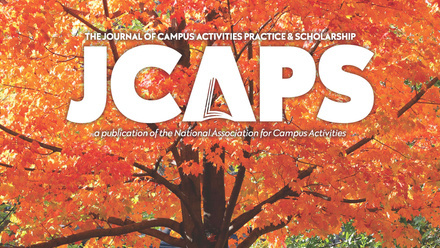Advice to New Professionals from a Mid-Manager Professional
When you are a new professional at a new institution you often ask yourself, what will I do on my first day? A few months in you are still asking yourself, what should I expect on Monday? I hope to give you some of my own advice and almost 15 years of experience and do's and don'ts as a mid-manager professional in the field for new professionals. A sort of, learn from me and things I wish I had known earlier but sometimes only gain through experience and learning from my own mistakes.
I could give a million pieces of advice but in this blog, I will give my top 15!
-
Learn to say no and set boundaries. – with students AND staff. For example, can you move an 8 p.m. Monday meeting to 5 p.m. instead? Can you move a Sunday training to a Friday? Or can you move it to Zoom at least. Obviously, cater to your students, but also look out for your own mental health and well-being and balance. If they can move it, then move it to a more appropriate time and day for you, as well. Don't wait too long until you are burnt out; take it before the burn out, if and when possible.
-
Turn off email notifications on your phone. Keep the email access on your phone, but you don't need to hear a ding every time someone emails you. Check it when you want/need but if you aren't at your computer. You don't need to be hearing constant pings of email notifications on your phone. The pings will just bring you stress and anxiety. The email can wait.
-
We are NOT ER doctors. I say this so often these days. If it's an emergency, the person will text or call us. Don't check email after hours or weekends or vacations, IT CAN WAIT. I have been guilty of not complying with this and if it stresses you too much out to wait to check, then check it, but often that brings more stress. Your evenings, weekends, and vacation times when you are not working is time that is supposed to be your down time, away from the stresses of work. Again, it can wait, and if it can't, they will usually get a hold of you by phone for a quicker, immediate response.
-
Find your own balance/self-care and keep up with it. This is too important not to reiterate again. Do not wait until you are burnt out or get sick. Learn from me and take the sick time, and vacation time, and the flex time. Get a hobby, workout, drink water, and get up from your desk. Your life should not be consumed by work or revolve around work. Go hang out with friends, go workout, go cook, or just go watch tv in your pjs at home; anything to take a break away from work. *A disclaimer with this is that I recognize that people of color are up against far more in life with systemic racism among many other things so self-care doesn't always look the same or others may not feel like they can take the time that is needed for it.
-
Keep your passion and your why or re-find it if you need to. Ask yourself why are you in Higher Education? What keeps you here? Why are you staying in it? Remind yourself of that, the good, the reason behind why you do what you do.
-
Manage up. Supervision is hard, so remember that your supervisor is human, too. Also, remember that most times it is not about you if your supervisor seems upset. We often think it is something we did but tying into #7 advice below, I learned from therapy that 95% of times it is not about you but is their own work or personal stress. Manage up when you can and give some grace to those who supervise you. We are trying our best at times, too. *Except for the bad, toxic supervisors, this is a different story for another time!
-
Consider talking with a mental health professional. Therapy is by far the best thing I have ever done for my personal and professional life, and the other staying active/working out (for both my mental and psychical health). Check with your EAP on campus or your insurance (many are starting to take insurance and therapy is free for some people now, especially in this Zoom world!) Check out Psychology Today for a therapist in your area and to find one that fits your needs, values, and background.
-
Find your people. Your "safe" space, outside of your office or boss to "process" things with, get advice, and bounce off ideas with. Find that support system or mentor.
-
Take on extra things that you want to do or that will help you grow. These are useful to have on your resume, but also realize that you are doing enough as is too sometimes. I have an eight-page resume currently, but I'm starting to question if that even really get me that far in my career or could I go just as far with having done half of those things that I have done/added to my plate that wasn't in my job description. Also, don't be pressured into doing a Ph.D. immediately. Getting a PhD or EdD is great, just make sure you are choosing to do so because you want to do it and don't feel the pressure to.
-
Mistakes are okay. It takes time to truly get good at your job/know your job. I recognize my privilege as a white woman and that this could be very different for people of color who often do not feel like they could make a mistake for fear of being fired or retaliated against. So, my advice would be to give yourself time and grace, it took me until about year three in the field to feel like I truly felt good and confident at my job. Find that support group. It's okay to ask for help, ask the questions to best learn the job.
-
Figure out what you have control over and what you don't. Give up some peace to what you can't control versus what you can influence, advocate for, etc. Try your best to make the changes on your campus that you see are needed and speak up but often we are up against policies, procedures, and campus politics and it's harder to enact change than we think, so figure out what you have the bandwidth for. And if it becomes too unhealthy of an environment where you feel like important things go unheard or changed, then leave if you can.
-
Have a life outside of work.
-
Growth mindset. See challenges as opportunities, see mistakes as what can I learn from this, see ways to always improve and grow and get better, that they aren't fixed and we are always learning. Learn to take and give criticism and feedback as constructive, helpful, and a learning opportunity,
-
Negotiate/advocate for your salary. Know that higher education usually does not have a huge bandwidth for negotiation unlike the corporate world but when you get an offer, it never hurts to try and ask for more. Know your worth and experience. Always at least and ask and try to negotiate salary or ask for that raise.
-
Remember your why. Remember that you cannot fill others' cups if your cup isn't full. You cannot pour from an empty cup. This relates to professional and personal life and relationships. Write your "why" and remind yourself of it, list the tasks that align with your "why." What actionable items are you working on each day to contribute to your "why" and what are some distractions from your "why."






